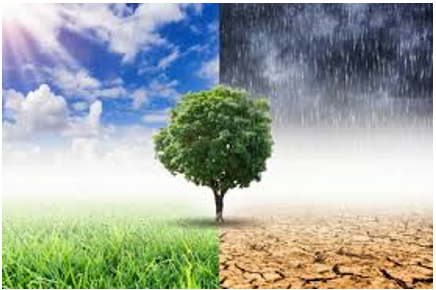i INP-WEALTHPK
Faiza Tehseen
Pakistan can achieve environmental sustainability and climate resilience by launching viable long-term initiatives, said Muhammad Saleem, media spokesperson for the climate change and environmental coordination ministry, while talking exclusively to WealthPK.

“From the rising temperatures to devastating floods, the impact of climate change is evident in Pakistan. Climate and nature work programmes will provide a comprehensive framework in this concern,” he said. According to the global risk index, Pakistan is one of the top 10 countries most affected by climate change. Intense heatwaves, catastrophic floods, and droughts threaten food security, water, and ecosystem sustainability. “The environmental crisis is further compounded by the unchecked urbanization, air pollution, and deforestation.
The need for implementation of sustainable and innovative programmes has never been greater. Implementation is crucial to safeguard the environment and develop resilience against the future challenges. In this regard, there is a need for focussing on agriculture, massive afforestation, renewable energy expansion, and water resource management.” Saleem said agriculture – the backbone of Pakistan’s economy – was highly vulnerable to the climate impacts. By introducing climate-smart farming techniques, efficient irrigation systems and drought-resistant crops, severe climate change impacts can be mitigated.
Capacity-building will enable the farmers to understand weather patterns and avoid financial and crop losses. Implementation of strategic afforestation programmes across the country is also necessary. It is critical to reduce Pakistan’s reliance on fossil fuels, which are contributing significantly towards greenhouse gas (GHG) emissions and air pollution. Investment in solar, hydro, and wind power projects can provide a clean and sustainable source of energy. The climate change and environmental coordination ministry official said comprehensive water resource management was also necessary to combat the water scarcity issue.
It may include upgradation of the irrigation infrastructure, rainwater harvesting, and saving the agricultural and industrial water bodies from pollution. In this regard, collaborative efforts can be planned at both regional and international levels. The Pakistani cities are not well-equipped to combat urban flooding, air pollution, and heatwaves, underscoring the need for introduction and implementation of policies. To implement these policies and make them more effective, there is a need for adequate funding, expertise, technical information, and even international coordination with the relevant organisations.
Talking to WealthPK about the importance of climate and conservation programs to cope with the environmental issues, Deputy Director at the Pakistan Forest Institute, Peshawar, Muhammad Aatif said, “Pakistan is considered among the countries having the highest deforestation rates. Strategically planned afforestation programmes are important to be launched as the top priority. Restoration of degraded forests and promotion of urban forestry can help combat pollution and sequester carbon emissions.
He said environmental challenges could never be tackled in isolation. Hence, Pakistan should go for international partnerships to get technical and financial support to effectively tackle them. To implement all this, a robust regulatory framework is also required to ensure that the environmental laws are enforced. Through proper execution and right foresight, Pakistan can turn its climate challenges into opportunities.
Credit: INP-WealthPk




